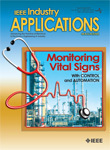Journal
Please choose volume & issue:
- IEEE Pulp & Paper 2026
- IEEE IAS ESTMP Workshop
-
A Year of Changes: Journey to 2026 [Chapter News]
Keywords:New ChapterEngagement Of MembersTravel GrantsAbstracts:Provides society information that may include news, reviews or technical notes that should be of interest to practitioners and researchers.
-
2026 IEEE Technical Field Award Winners [Awards]
Keywords:AwardsIndustrial ApplicationsTransport SystemPower SystemElectric VehiclesRare Earth ElementsFuel CellElectrical EngineeringPermanent MagnetPower ElectronicsSynchronous MotorPermanent Magnet Synchronous MotorElectric MachineHybrid ElectricHybrid Electric VehiclesMachine DesignModular Multilevel ConverterRecognition Of ContributionsPermanent Magnet MachinesUniversity Of PadovaRare-earth MagnetsMcMaster UniversityIndustrial SystemsAnalysis MachineElectric PowerFinite ElementElectrical DesignAbstracts:Presents the recipients of IEEE Industry Applications Society (IAS) awards for 2026.
-
Webinar Recap: Advanced Modeling and Control of Inverter-Based Resources for Future Power Grids [Education News]
Keywords:Power GridControl Of ResourcesInverter-based ResourcesProfessional DevelopmentEnergy DistributionScale ModelFault-tolerantSmart GridControl ArchitectureIntelligent ControlDistributed Energy ResourcesSmall-signal AnalysisRenewable IntegrationData-driven FrameworkState-space MethodAbstracts:Provides society information that may include news, reviews or technical notes that should be of interest to practitioners and researchers.
-
In Memoriam: Blake Alan Lloyd [Society News]
Keywords:ObituariesLloyd, Blake AlanPulp And PaperEnergy Conversion DevicesMotor ProblemsPartial DischargeJob OpeningsPrimary JobNieces And NephewsAbstracts:Recounts the career and contributions of Blake Alan Lloyd.
-
How IAS Volunteers Impact Standards Development Beyond IEEE [Standards News]
Keywords:Renewable EnergyPower SystemElectric DistributionMicrogridElectric Vehicles ChargingStatutory LawEnd-usersStorage SystemsPhotovoltaic SystemSolar PhotovoltaicAbstracts:Provides society information that may include news, reviews or technical notes that should be of interest to practitioners and researchers.
-
Cultivating Curiosity in Practice and Profession [Pathways]
Keywords:High SchoolCreativityPower SystemJob SatisfactionOil And GasProject ManagementElectrical EngineeringLas VegasBoard GamesYear Of High SchoolYoung ProfessionalsDrill BitSandia National LaboratoriesEmergency Power
-
How to Be the Employee in Charge (EIC) for a High-Voltage Task: Designating the Responsibilities of the EIC
Keywords:Communication SkillsPersonal Protective EquipmentLow VoltageOccupational SafetySpecific RulesSwitching OperationSafety RulesHigh Operating VoltageQualified Person
-
The Path to Decarbonization Through Electrification: A Refinery Case Study and Lessons Learned
Keywords:Gas insulationElectrificationCogenerationSubstationsSchedulesFCCTurbinesMotorsCable insulationLow carbon economyDecarbonizationRefineryEnergy SourceEnergy EfficiencyOil And GasNew IndustriesImprove Energy EfficiencyGas IndustryOil And Gas IndustryChallenge For IndustryKey SolutionElectrical ProcessGreenhouse GasTransformerElectric PowerTransmission LineProtection SchemeProject TeamProject PhaseDesign PhaseLegislative RequirementsSleep StartCarbon IntensityProject SchedulingFishbone DiagramOptic CablesLow Carbon EmissionsApproval ProcessDesign TeamLead TimeAbstracts:The oil and gas industry faces the challenge of strategically becoming more efficient, sustainable, and environmentally responsive. For the industry to achieve that transformation, decarbonization is one option, and a key solution therein is decarbonation through electrification, a process that involves modifying, upgrading, and/or replacing steam-driven assets with more efficient electrically driven equipment. The electrification process also requires new sources of energy, a robust power system, and possibly even the reconfiguration or upgrade of electrical distribution. Alternatively, improvement of energy efficiency is another option to rise to these new industry challenges.
Hot Journals
- Risk Breakdown Matrix for Risk-Based Inspection of Transportation Infrastructure Projects
- Social Control in Outsourced Architectural and Engineering Design Consulting Projects: Behavioral Consequences and Motivational Mechanism
- 2022 Best Paper Award
- Hold-Ups and Failures in Negotiated Order: Unearthing the Nuances of Rework Causation in Construction
- Prevalence and Risk Factors for Poor Mental Health and Suicidal Ideation in the Nigerian Construction Industry
- CFRP–Cable-Stayed Bridge Hybrid with Partial Suspension and a Span Exceeding 3,000 m: Concept, Optimization, and Construction
- Impact of Wind Load Characteristics on Computed Bridge Stay-Cable Forces Used for Bridge Health Monitoring
- Weak-End and Frequency Detection of Elastically Supported Bridges by Contact Residual Response of Two-Axle Test Vehicle in a Round Trip
- Development of Performance-Based Fragility Curves of Coastal Bridges Subjected to Extreme Wave-Induced Loads
- An Analytical Model to Evaluate Short- and Long-Term Performances of Post-Tensioned Concrete Box-Girder Bridges Rehabilitated by an Ultrahigh-Performance Concrete Overlay
- Three-Dimensional Velocity Distribution in Straight Smooth Channels Modeled by Modified Log-Law
- Experimental Investigation on Flow Past Two and Three Side-by-Side Inclined Cylinders
- An Experimental Investigation of Rotor–Box Aerodynamic Interaction 1
- Modeling Gas–Liquid Flow Between Rotating and Nonrotating Annular Disks
- Entry Length Requirements for Two- and Three-Dimensional Laminar Couette–Poiseuille Flows
Advanced Materials (3,745)
- Structured Perovskite Light Absorbers for Efficient and Stable Photovoltaics
- Strategies for High‐Performance Solid‐State Triplet–Triplet‐Annihilation‐Based Photon Upconversion
- Atomic Engineering Catalyzed MnO2 Electrolysis Kinetics for a Hybrid Aqueous Battery with High Power and Energy Density
- Crystal Adaptronics: Global Performance Indices for Dynamic Crystals as Organic Thermal Actuators (Adv. Mater. 20/2020)
- Enlightening Materials with Photoswitches
Acta Astronautica (1,768)
- Mixed-integer trajectory optimization with no-fly zone constraints for a hypersonic vehicle
- Adaptive control design for active Pogo suppression of large strap-on liquid launch vehicles
- Machine learning based approach for modeling and forecasting of GPS–TEC during diverse solar phase periods
- Effect of two-dimensional micro-cavity surface on hypersonic boundary layer
- Investigation on burning behaviors of aluminum agglomerates in solid rocket motor with detailed combustion model








 User Center
User Center My Training Class
My Training Class Feedback
Feedback





